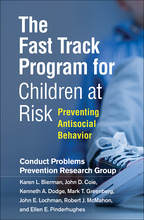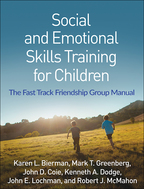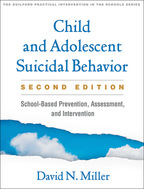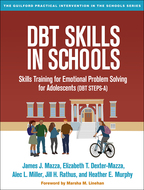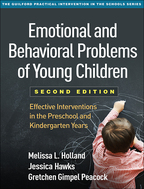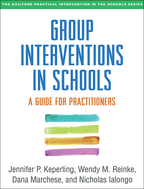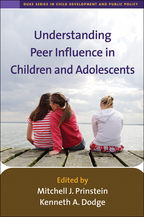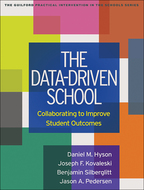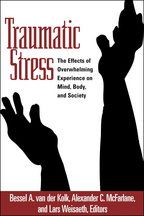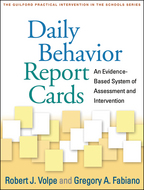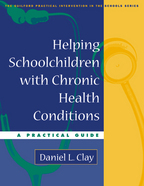The Fast Track Program for Children at Risk
Preventing Antisocial Behavior
Conduct Problems Prevention Research Group, Karen L. Bierman, John D. Coie, Kenneth A. Dodge, Mark T. Greenberg, John E. Lochman, Robert J. McMahon, and Ellen E. Pinderhughes
Foreword by Patrick H. Tolan
Hardcovere-bookprint + e-book
Hardcover
orderOctober 30, 2019
ISBN 9781462541294
Price: $36.00 211 Pages
Size: 6" x 9"
“Fast Track is unrivaled in terms of its scope and enduring beneficial impacts from childhood to adulthood. This superbly written book should serve as a primer for local, state, and federal policymakers interested in implementing effective prevention programming. It should be at the top of the reading lists of advanced undergraduate and graduate courses on prevention in community, school, and clinical psychology programs, and is a 'must read' for prevention scientists working in school settings.”

—Nicholas Ialongo, PhD, Department of Mental Health, Johns Hopkins Bloomberg School of Public Health
“I have had the privilege of reviewing the Fast Track research since its earliest stages. We had an inkling then—almost 30 years ago—that if these researchers could collaborate deeply and bring about their hugely ambitious programming and research plans, their contributions would be enormous. With this extraordinary book, all those concerned with the well-being of children and youth now can see that when timely, wraparound supports are provided to disadvantaged children and their families, developmental pathways can be diverted to positive life outcomes. This book will be perfect as a foundation for my graduate teaching in social-emotional development and program evaluation.”

—Debra Pepler, PhD, CPsych, Distinguished Research Professor of Psychology, York University, Toronto, Canada
“The scientists who led Fast Track—a most impressive endeavor that began in early childhood, spanned three decades, and focused on averting the development of criminality and violence—have authored a consequential book. This landmark study not only gauges prevention outcomes related to criminality, substance misuse, and mental health, but also provides a wealth of critical information about familial, peer, school, community, brain, and genetic influences.”

—Ron Prinz, PhD, Carolina Distinguished Professor in Psychology, University of South Carolina
“Every component of this multimodal, multidomain prevention program is developmentally sensitive and science based. Beyond its clinical and practical usefulness for prevention practitioners, this book is a source of inspiration and troubleshooting for scholars and students who plan to design, implement, and evaluate large-scale prevention programs.”

—Frank Vitaro, PhD, School of Psychoeducation, University of Montreal, Canada
—Nicholas Ialongo, PhD, Department of Mental Health, Johns Hopkins Bloomberg School of Public Health
“I have had the privilege of reviewing the Fast Track research since its earliest stages. We had an inkling then—almost 30 years ago—that if these researchers could collaborate deeply and bring about their hugely ambitious programming and research plans, their contributions would be enormous. With this extraordinary book, all those concerned with the well-being of children and youth now can see that when timely, wraparound supports are provided to disadvantaged children and their families, developmental pathways can be diverted to positive life outcomes. This book will be perfect as a foundation for my graduate teaching in social-emotional development and program evaluation.”
—Debra Pepler, PhD, CPsych, Distinguished Research Professor of Psychology, York University, Toronto, Canada
“The scientists who led Fast Track—a most impressive endeavor that began in early childhood, spanned three decades, and focused on averting the development of criminality and violence—have authored a consequential book. This landmark study not only gauges prevention outcomes related to criminality, substance misuse, and mental health, but also provides a wealth of critical information about familial, peer, school, community, brain, and genetic influences.”
—Ron Prinz, PhD, Carolina Distinguished Professor in Psychology, University of South Carolina
“Every component of this multimodal, multidomain prevention program is developmentally sensitive and science based. Beyond its clinical and practical usefulness for prevention practitioners, this book is a source of inspiration and troubleshooting for scholars and students who plan to design, implement, and evaluate large-scale prevention programs.”
—Frank Vitaro, PhD, School of Psychoeducation, University of Montreal, Canada

